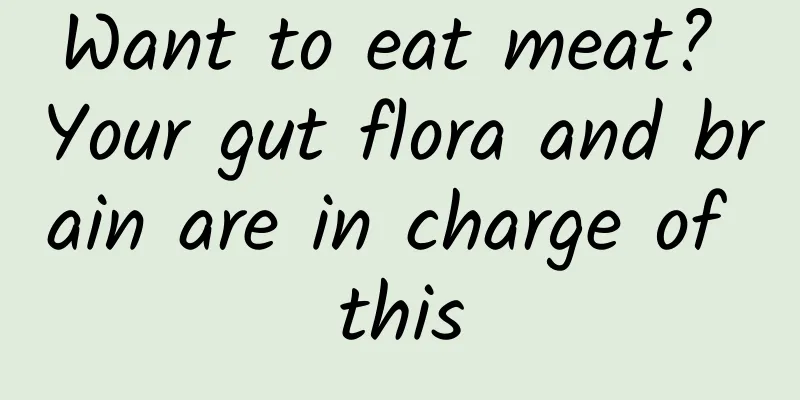Want to eat meat? Your gut flora and brain are in charge of this

|
Animals need a balanced intake of nutrients such as carbohydrates, proteins and fats to maintain health. Meat is rich in protein, but if you consume too much, it will be harmful to the human body because in addition to protein, it contains a lot of animal fat and cholesterol. Excessive protein contains a lot of nitrogen, which is decomposed by deamination and turned into urea and excreted in urine. This process requires a lot of water, which will increase the burden on the kidneys, and the harm will be greater if the kidneys are not in good condition. Eating too much meat will result in excessive intake of sulfur-containing amino acids, which will accelerate the loss of calcium in the bones and lead to osteoporosis. But if the diet is not protein-rich, it will lead to severe malnutrition. However, when protein intake is insufficient, animals will actively choose foods rich in protein or essential amino acids. A study from the Korea Advanced Institute of Science and Technology and Seoul National University found that fruit flies' food choices are influenced by a "dialogue" between the intestines and the brain, regulating their desire for foods rich in protein or essential amino acids. In fruit flies, the gut bacteria-gut-brain axis, commonly known as the bacteria-gut-brain axis, can detect whether essential amino acids are deficient and stimulate the fruit flies' desire for these amino acids. Scientists have known that when an organism does not get enough protein, it will preferentially choose foods rich in protein or essential amino acids, but they are not sure how this happens. Protein starvation in fruit flies triggers the release of a gut hormone called the neuropeptide CNMamide (CNMa) from specific intestinal cells. CNMa signals the nutritional status of the gut to the brain, triggering the desire to eat food containing essential amino acids. They also found that gut bacteria - Acetobacter bacteria - produce amino acids that can compensate for slight protein deficiencies in the diet. Supplementing this bacterium alone can produce amino acids that can alter the release of CNMa and alleviate the fruit fly's desire to "eat meat." However, gnotobiotic flies carrying mutant gut bacteria that do not produce leucine or other amino acids showed higher CNMa expression and greater appetite. Enterocytes sense amino acid levels from the diet and gut bacteria and communicate amino acid deficiencies to the brain via CNMa. Therefore, there may be a similar mechanism in the human body, that is, your desires are not necessarily controlled by you, and your intestinal microorganisms may also be involved. There is a more detailed explanation in the section on desire in my course. References: Boram Kim et al. Response of the microbiome–gut–brain axis in Drosophila to amino acid deficit. Nature, 2021, doi:10.1038/s41586-021-03522-2. |
Recommend
Is your body exhausted? A table to calculate your fatigue index
Do you have the following symptoms? Your head fee...
Girls' body hair suddenly increases?
In daily life, it is a pity for many people with ...
What are the side effects of taking diet pills during menstruation?
In order to have a better body shape, some female...
What to do if your hands and feet are swollen during late pregnancy
The happiest moment in every woman’s life is when...
How much does it cost to go to the hospital to check pregnancy
Due to the epidemic, our food, clothing, housing,...
How to cook the rice dumplings bought from the supermarket? Should we boil or steam them?
The custom of eating zongzi during the Dragon Boa...
Drinking too much of these teas can actually harm your health? Don’t drink too much!
We Chinese people love tea deeply, and brewing an...
What are the items for follow-up examination after miscarriage?
For friends who have just had an abortion, it is ...
Is it normal to gain 30 pounds during pregnancy?
After pregnancy, the fetus will change, and the p...
How to quickly stimulate female hormones
Androgen is a hormone naturally secreted by the h...
What causes chest pain?
Breasts are very important organs for women. Brea...
Causes of myocardial ischemia in women
Myocardial ischemia in women refers to a conditio...
Why do we need to do neck ultrasound?
Neck B-ultrasound is mainly used to examine some ...
What is the reason for the little girl's excessive vaginal discharge?
Excessive vaginal discharge in a girl refers to a...









